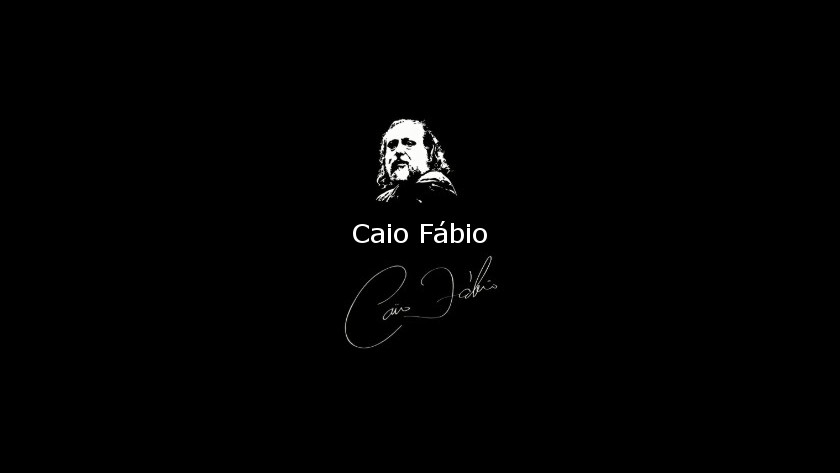
I HAVE JESUS BUT I AM UNHAPPY. WHAT SHOULD I DO?
To: contato@caiofabio.com
Sent: Monday, July 25, 2005 5:12 PM
Subject: O que fazer se tenho Jesus mas não sou feliz? (What to do if I have Jesus but I’m not happy?)
Dear Caio,
Sent: Monday, July 25, 2005 5:12 PM
Subject: O que fazer se tenho Jesus mas não sou feliz? (What to do if I have Jesus but I’m not happy?)
Dear Caio,
Here I am again, in want of a “virtual bosom” that has always been so good to me.
I’ve always been told that the fact of having Jesus necessarily makes you a happy person. But it has not happened to me. I haven’t found anything of value in life. Sometimes I’d rather die because nothing seems to be meaningful to me. If I die now, I know I’ll be with my Father—and this is, maybe, the only thing I’m sure about.
I have two children, who are my reason to stay “alive”, although I sometimes ask myself, “What for?”
I got into a shell and I can’t get out…
I’m in need of joy; I need to derive pleasure from what I do, but I can’t. In fact, crying is all I have been able to do.
Help me! Comfort me! Lend me a hand, please!
Very affectionately,
Rute
________________________________________
Reply:
My dear friend,
Grace and Peace!
Siddhartha, the Buda, said that “living is suffering”. He said so after verifying that the cause of most human sufferings comes from leading a life that is based on the desire of being happy. So, at first he developed a theory that meant an attempt to “numb” personal desire, individual will and whatever meant an ambition for being, having or being capable. After that, he himself realized, out of his own experience, that such things have an appearance of wisdom and humbleness, but, deep down, they have no power to restrain the soul’s pulsions. It was then that he came up with the “middle-course” theory, where “balance” should prevail.
Well, you don’t need to take a journey like Siddhartha’s in order to come to this conclusion, since Jesus Himself taught us, once and for all, not as an “experiment”, but as the Incarnation of Truth, all we need to know in order to be and live in God.
The point is: In the past men and women wanted peace. Today they want “to be happy”. Well, happiness is always present in true peace. However, a search for happiness as our life’s aim always robs us of peace.
The concept of happiness that upsets you today will keep upsetting you as long as your expectations are this world’s expectations. Jesus said that He had a sort of peace to give us which was not like “the world’s peace”.
The “world’s peace” comes from having everything under control and in our power. When this is so, then we say we’re at peace. But if something — be whatever it may — happens, then, right away that peace fades away, because it draws its meaning from the circumstances, not the unchangeable facts of faith.
Besides, the present concept of “happiness” is a result of a huge marketing fake and, above all, fruit of romantic fantasies and “happy-forever” patterns that the cinema and television industries have created to us as “laws for a joyful life”.
Therefore, the first thing to do is to stop comparing yourself to others — I mean, comparisons such as, “Why do I who believe in Jesus don’t have a lover, a husband home, whereas unbelievers have a date every day?”
Yes, it’s this kind of things that brings about the “comparisons” that cause your sense of meaninglessness to increase, and, consequently, your disappointment in life and your feeling of “deceit” with relation to Jesus.
You only mentioned two positive things: Your children — who still provide you with a reason for the battle of existence … despite the whys — and your faith in Jesus, in whose arms you believe you’d be infinitely better, but only if you died.
Well, these two realities are exactly the ones that strengthen the most our existential meaning of truth. Paul said he’d rather not “leave” because of “his children”, spiritual children, for whom he still was in the pains of childbirth. But he admits he sometimes had to endure so much real pressure that, at a given time, he despaired even of life. He also admitted finding it infinitely better to leave and be with Christ, but, because of the ones he loved in the world, he’d rather stay and love them to the last, only departing when God took him.
On the other hand, Paul also says that it’s our vision of transcendence that saves us from burying ourselves along with the hopelessness of the present life. That’s why he says that if our faith limited itself to small, frail hopes linked to this existence only (even if in Jesus’ name), they wouldn’t be enough to keep us existentially hopeful.
Interestingly, the word “happy” appears in the New Testament in the midst of paradox. Happy people cry. Happy people learn humbly. Happy people have totally cleansed minds. Happy people get hold of themselves (they’re meek). Happy people seek after righteousness Happy people are often persecuted.
On the other hand, Jesus says “woe to you” to those who live a life of scornful laughter in a world of pain, those who live luxuriously in a world of shortage and misery, those who live from “rewards” in a world that pays the poor and the righteous with indifference, and those who had all the reasons to be conceited due to getting everybody’s praise — like they had done to the false prophets, who lived to satisfy the “law of average”.
“Blessed” (makarius) is a term that means spiritual happiness, not material or historical happiness. Therefore it has nothing to do with the Prosperity Theology. Instead, it indicates the spiritual road of the disciple who has given up all earthly rewards and, for that reason, doesn’t expect his/her peace from this world. On the contrary, the peace of Christ makes the world ironical to him/her.
But the fact is that both the “church” and Hollywood sell us the same fantasy: Happy forever … married forever … certainties forever … etc. And if something goes wrong, it’s your fault.
Jesus, though, never talked about that; and in the Gospels, all who approached Him had practical problems. No one ever asked Him, “Teacher, what should I do to be happy? To find a husband? To attain all that successful women have?”
On the contrary, Jesus said that walking along with Him implied in “letting go of” such expectations (father, mother, wife, children, friends, home, etc) and embrace the eternal joy of God’s Kingdom’s, following Him only by unselfish faith, and loving God and one’s neighbor. He also taught us to leave behind the anxieties of the present existence in order to embrace the Kingdom first, in our inner lives, as trust and hope.
This “happiness” that doesn’t have to learn (is not humble), doesn’t cry, doesn’t keep your heart cleansed from envy and the diseases of greediness, doesn’t live to pacify your neighbor and yourself, flees from what is righteous in order not to take the trouble, and agrees to everything so as not to be persecuted — comes from the Western renaissance-based mindset, and, in the Near East, from the One Thousand and One Nights love fantasies of the Arabian culture.
Hollywood only sold what is buyable: fantasy!
To Jesus, to be happy is to keep your feet on the ground and your heart in the eternal joys. That’s why He did not say to Mary, who sat at His feet listening to His teachings, “One thing you lack: A husband!” On the contrary, He said, “You lack nothing! And you’ve chosen what is better, and it will not be taken away from you!”
Happiness, to Jesus, is a state of trustfulness in Him, His teachings and the certainty of the Life that Is. This has nothing to do with being spared from suffering. It has to do with no longer suffering the pain of the hopeless.
In the New Testament, “happiness” is interchangeable with other terms such as faith, hope, love, assurance, riches in glory, and inheritance of the saints in Light. When such things are the foundation of your being, even not seeking earthly happiness obsessively, a disciple encounters and experiences happiness as he/she gives it up. Yes, because when an individual lets go of the “Hollywoodian” happiness obsession, he/she starts tasting something different from what is imposed as the normal criterion of happiness — the worldly criterion — by just seeking to be in God. Paradoxically, it is from this renouncement that all good things come, because in this way your soul not only stops resentfully comparing itself to others’ happiness, but also feels free and at ease to embrace every sacrament that life serves you.
Therefore, the first thing to do is to stop watching soap operas and stop seeking after Hollywood’s fantasies as an existential pattern.
Secondly, you should see a doctor, a psychiatrist, and find out if you have a depression, or, even more seriously, if it is “organically chronic”. In both cases you’ll have to take medicine, and your depression will “wear off” very soon. Then, rid of the organic distress, you’ll be able to focus on things in a better way, which will allow you to learn how to soothe your heart, no longer mixing a chemical ailment with existential and spiritual distress.
For the rest, read the Psalms in a loud voice, and do it with no self-pity, but rejoicing in faith, knowing that your God is your Father and is Good!
In Him, in Whom happiness is to know how to live without comparisons and with lots of gratefulness,
Caio
_______________________________
Read the following text:
WHILE HEAVEN DOESN’T COME
What am I supposed to do with myself until the time to go to Heaven comes?
Today that is the question that throbs in the innermost being of almost all Christians who call themselves “converts”.
They have converted, but don’t know what to, let alone what for!
There are the ones who cover up the throbbing question by giving a quick answer:
“I’ve converted in order to glorify God and be a witness of His Kingdom”. Then, after confessing so, they start rushing nonstop, from one place to another in order to save the world, not realizing that rushing and rushing is their big need; otherwise they would die of depression if they looked at themselves and saw their countless irresolution issues.
The so-called “work of God” conceals a major need of true works of God in our beings—but we’re not willing to be open to experience them.
The Gospel is this Good News about what and how we are supposed to live until we are absorbed into Life.
The problem, to many of us, is that two things happen:
1. Once as “converts”, we start to believe that the Gospel that saved us is now only for “the others”—the lost ones whom we need to reach out. In this way, the Good News becomes, to us, some kind of “Herbalife” that we are committed to sell as a diet kit so that the business expands in a pyramidal way. But it no longer has anything to do with us; it’s only about the others’ damnation.
2. Once as “converts”, we lose our own souls—I mean, “soul” as “psyche”. We get a “saved soul”—which awaits heaven—whereas we lose our soul as a place of continual move, growth, experiencing of seasons and self-discovery. That is, the soul stops being a place of adventure and personal growth.
That’s why more and more huge hordes of sick, unhappy Christians keep on appearing. After all, what was offered them as life on the day called Today now became just a heavenly bond to be cashed, on a day called Who Knows, under the form of some reward for having endured such a miserable living until Heaven finally came.
Faithful is the Word...
Christ Jesus came into the world to save sinners…
Of whom I am the worst…
In this way, above all and everything, the Gospel is for me.
I need the Spirit’s Grace and Love to live on the Earth.
It wasn’t for anything else that the Gospel reached us.
Caio
_______________________________
From the originals: “O QUE FAZER SE TENHO JESUS E SOU INFELIZ?” and “ENQUANTO O CÉU NÃO CHEGAR”
Translated by F. R. Castelo Branco | April 
